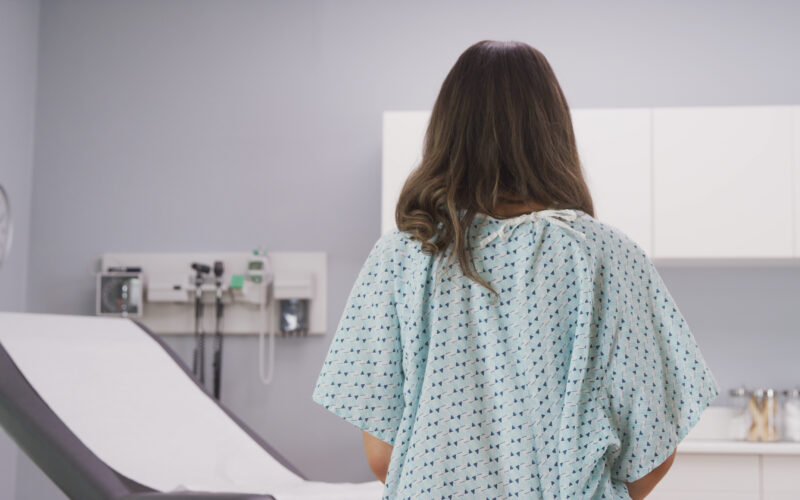Between 6-12% of women of childbearing age in the United States have Polycystic Ovarian Syndrome, also known as PCOS, according to the Centers for Disease Control and Prevention (CDC). It classically manifests with symptoms of obesity or overweight, heavy menstrual bleeding (or, conversely, very short and light bleeding), hirsutism (male-pattern hair growth on the face, chest, and/or back), acne or oily skin, depression as well as very long cycles between periods.
Thanks to what we know about a healthy cycle from Fertility Awareness Methods of charting, we have a lot more information about PCOS today and how to treat it. Here are some commonly asked questions about PCOS and some answers.
What is PCOS?
PCOS is a reproductive hormonal disorder that causes cysts to grow on the ovaries, resulting in hormonal imbalances. Many women suffer from PCOS without knowing it, according to Krizia Liquido in her article for Natural Womanhood, “How I Broke Free From PMS Pain.” Statistics show between 10 to 20 percent women have PCOS, yet more than 50 percent are undiagnosed. The cause of PCOS goes back to an excess of exposure before a woman’s birth to a hormone called the anti-Müllerian hormone.
The many symptoms of PCOS can include severe cramps, irregular cycles, cystic acne, chronic fatigue, anxiety, and depression, as well as:
- chronic inflammation
- easy weight gain
- insulin resistance and hyperinsulinemia
- cardiovascular issues
- Type 2 Diabetes
- poor body image or eating disorders
- hair loss or growth
- high levels of androgens
- male-pattern hair growth
- thyroid disorders
If you have some of these symptoms, ask your doctor to order tests and learn to chart your cycle using a Fertility Awareness Method. When consulting with your doctor, it can help speed up your diagnosis if you share your full family history and do not downplay your symptoms. Charting will help you identify abnormal signs, and if you see a doctor trained in restorative reproductive medicine (RRM) who understands fertility awareness charting, they can use this information to diagnose PCOS. Furthermore, making some lifestyle changes such as diet and exercise can help minimize PCOS symptoms.
Does PCOS cause weight gain?
Yes, weight gain is one of the many possible symptoms associated with PCOS, though it’s also possible to have PCOS with a normal or low body mass index (BMI). According to the Cleveland Clinic, Women with PCOS do not produce normal insulin levels. “Instead, their bodies over-produce insulin in an attempt to maintain a normal blood sugar level, and this frequently leads to more androgen production and weight gain.” In turn, this can lead to a frustrating cycle where, as a woman gains weight, her PCOS symptoms can become more severe.
Does PCOS cause depression?
Yes. Studies have found that depression and anxiety are more prevalent in women with PCOS.
The reasons for this are complex, as noted in a study in the Indian Journal of Psychological Medicine. Causing undesirable physical side effects to potential infertility, PCOS “can be deeply stigmatizing to women. In a qualitative study on the subjective experience of PCOS, women described feeling robbed of their self-concept, essence of being feminine, and attractive.”
Can PCOS be reversed?
As of now, there is no cure, but it can be minimized and monitored with charting and changes to diet and lifestyle. Furthermore, Natural Procreative Technology (NaProTechnology) has been successful in the treatment of PCOS (more on this below).
Can PCOS affect pregnancy?
Yes, the cycle irregularity characteristic of PCOS can affect your ability to get pregnant because it can affect how frequently you ovulate, and ovulation is necessary for conception.
Will PCOS make me infertile?
It can. PCOS is the most common cause of infertility in women. The hormonal imbalances interfere with ovulation, which can lead to irregular or completely skipped periods, making it difficult or impossible to get pregnant. However, there are some treatments that can help restore ovulation and improve one’s chances of pregnancy, with the help of a NaProTechnology doctor.
What do I do if I have PCOS?
While there currently isn’t a cure for PCOS, there are ways to treat and manage it. Some women with PCOS “have found success with a unique diet, moderate exercise, and use of a progesterone cream,” Lindsay Schlegel writes in an article for Natural Womanhood, “How to Solve Period Issues without the Pill.” A bioidentical form of progesterone can “help regulate the hormones during the woman’s cycle, and thus establish more regular ovulation, with virtually no side effects, because the product is a replica of what the body produces on its own.”
How exactly might progesterone help? In a 2021 case study on the effectiveness of oral micronized progesterone in a woman suffering from PCOS, the authors wrote “increasing evidence suggests that PCOS is characterized by a central dysregulation of the hypothalamic–pituitary–ovarian axis with rapid pulsing of gonadotrophin releasing hormone [11,12]. This results in rapidly pulsing luteinizing hormone (LH), which stimulates ovarian androgen production and prevents normal ovulation. Cyclic progesterone therapy may improve these fundamental PCOS changes [13,14]; progesterone physiologically slows LH pulsatility at the menstrual midcycle [15].”
What about hormonal birth control for PCOS?
If you are currently on hormonal birth control (a common Band-Aid prescription for PCOS that masks the symptoms and therefore may delay accurate diagnosis and effective treatment), be aware that hormonal contraceptives can exacerbate the effects of PCOS. Further, being on contraceptives will make it impossible to accurately chart your cycle and get to the bottom of what type of cysts you are experiencing.
Surgery
NaProTechnology is also advancing the treatment of PCOS. PCOS can be treated with the surgical wedge resection procedure, which reduces the size of the ovaries. Although it currently isn’t a cure, the surgery may provide relief, especially when coupled with a balance to hormones and changes to health and diet, although you should speak to a doctor before making any major diet changes or taking new supplements.
A relatively new surgical procedure called laparoscopic ovarian drilling (LOD) might provide some women relief as well. According to a 2020 review of literature, LOD is the “Laparoscopic application of heat or laser to the ovaries to cause ovulation in women with polycystic ovary syndrome who do not ovulate” [1]. According to the review of literature, it may be too soon to tell whether LOD leads to more live births or clinical pregnancies and/or fewer miscarriages or pregnancies with multiples than medical ovulation induction (as with Clomid) alone. Higher quality studies are needed to effectively LOD’s utility in treating PCOS.
This page was last updated on April 25, 2023 to include additional links and several content clarifications.
References:
[1] Bordewijk EM, Ng KYB, Rakic L, Mol BWJ, Brown J, Crawford TJ, van Wely M. Laparoscopic ovarian drilling for ovulation induction in women with anovulatory polycystic ovary syndrome. Cochrane Database Syst Rev. 2020 Feb 11;2(2):CD001122. doi: 10.1002/14651858.CD001122.pub5. PMID: 32048270; PMCID: PMC7013239.







Finally, a guide on managing PCOS! This blog breaks down complex info into simple steps.